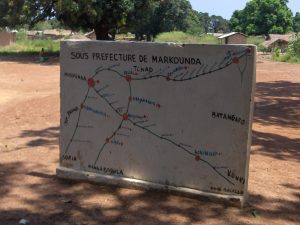

Before I get on to the student-y bit of this blog, I’ll update you on the madness which constitutes my working life in the humanitarian sector in Central African Republic.
Boringly, I’ve just endured malaria bout #9. I’m getting rather sick (pun intended) of it. There simply is no respite. It’s there waiting every month to ruin things for a few days or more. This time round I had a spot of bother with my vision. Now that made reading for a dissertation a bit hard, so I gave up for about five days and allowed doctors to push me around and utter soothing words. All very, very rubbish.

Having been in the far north of Central African Republic for almost two years, I’ve travelled the zone a great deal, sometimes getting quite near the troubled border with Chad but never too close. That changed last weekend when I spent the weekend away from my rural base and headed right out into the sticks. I’ve now seen the border with Chad. It’s a river, except this river has angry young men on either side of it – and they can see each other, though they don’t remain visible for long for obvious reasons. They won’t be playing football with each other on Christmas Day, I can tell you that much. I was up there to oversee a rehabilitation of a health post, and see if we can start getting drugs to, quite easily, the most remote area in which we work out here. It was a fantastic experience.

When I head up to the border I invariably stay in a catholic mission. They are safe environments and, most importantly, they serve decent food. Yam and onion soup for breakfast was a winner. The level of luxury in the accommodation depends on the security environment (religious orders don’t send lots of furniture and goods to areas where they will probably be pillaged), so this one was quite basic (see photo), but pretty standard out here. An indication of the troubles in the area was that the sub-prefect was resident in the mission as his house and office had been destroyed.
Since the last blog progress has continued on my dissertation at quite a rate. As a distance learning postgrad student I am required to fulfil certain weekly tasks (though these are certainly not as demanding as the weekly tasks on the previous four guided modules). The pace of the dissertation module means that the student has a lot of time to reflect on structure and content. It appears that every student on the module has spent the summer reading and so most of us have an almost clear idea of what we want to study. The online process gradually channels the student towards a clear research goal and a dissertation structure, otherwise I’d end up with something like ‘This dissertation is about humanitarian aid because that’s really important.’ I’m not sure I could run that up the flagpole and emerge unscathed.
Throughout the entire journey of the MA in International Policy and Diplomacy, I have had a very specific approach to my writing. I call it the blunderbuss approach. I read incessantly and, if I come across something I think will be useful, I write a paragraph with the necessary footnote if appropriate. At weekends, I like to review what I’ve written and link ideas. Sometimes this means that entire paragraphs are discarded (I try and envisage the reaction of my tutor when I can see that something is weak – that can be a useful editing tool); at other times, an idea can run and run and, all of a sudden I’ve hit on the argument and I have a valid point or two. One of the benefits of this approach is that I never have writer’s block. I just write! If it doesn’t make the final cut, too bad. I think I’ve put together about 3,500 words for the dissertation, covering different ideas which may suit the introduction or one of the chapters. This does make me feel slightly easier if I know that I’ve got some knowledge in the bank already. However, this evening I attempted to rationalise my thoughts on global governance of humanitarian aid… those moments when you realise that you’re not quite as clever as you thought you were 30 seconds earlier. At that point I closed my work down and decided to write this blog.

Good advice about writing, echoed in Rowena Murray How to write a Thesis, now in its 3rd edition
Martin